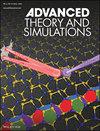A Database of Composition‐Processing‐Performance Parameters for over 400 Inorganic‐Polymer Composite Solid‐State Electrolytes
IF 2.9
4区 工程技术
Q1 MULTIDISCIPLINARY SCIENCES
引用次数: 0
Abstract
Inorganic‐polymer composite solid‐state electrolytes (IPCSEs), which combine the advantages of inorganic fillers and polymer matrices, have emerged as promising candidates for all‐solid‐state batteries. However, achieving high ionic conductivity at room‐temperature remains challenging due to interfacial phase effects, percolation‐threshold limitations, and processing‐induced structural defects. Moreover, the fragmentation and heterogeneity of existing literature data complicates systematic optimization, necessitating a unified database for data‐driven discovery. Here, a comprehensive and traceable database is constructed by extracting and consolidating data from peer‐reviewed literature, encompassing material compositions, processing conditions, and electrolyte performance for over 400 IPCSEs. Through Pearson correlation analysis, which quantifies a linear relationship between variables, key factors influencing ionic conductivity are identified, including filler type, content, and morphology. To validate the database's utility, a machine‐learning‐ready dataset is constructed and tassorted predictive models are trained. Experimental results show that the ionic conductivity prediction performance of support vector regression reaches an R超过400种无机-聚合物复合固态电解质的组成-加工-性能参数数据库
无机聚合物复合固态电解质(ipcse)结合了无机填料和聚合物基体的优点,已成为全固态电池的有前途的候选者。然而,由于界面相效应、渗透阈值限制和加工引起的结构缺陷,在室温下实现高离子电导率仍然具有挑战性。此外,现有文献数据的碎片化和异质性使系统优化变得复杂,需要一个统一的数据库来进行数据驱动的发现。在这里,通过从同行评审文献中提取和整合数据,构建了一个全面和可追溯的数据库,包括400多个ipcse的材料成分,加工条件和电解质性能。通过量化变量之间线性关系的Pearson相关分析,确定了影响离子电导率的关键因素,包括填料类型、含量和形态。为了验证数据库的实用性,构建了一个机器学习就绪的数据集,并训练了各种预测模型。实验结果表明,支持向量回归的离子电导率预测性能达到了0.90的R2,证明了数据集的高质量,以及在设计优化和成分-处理-性能关系的定量评估方面的前景。这项工作不仅为人工智能驱动的电解质开发提供了一个结构数据库,而且还将数据驱动的见解转化为推进固态电池材料的实用工具。
本文章由计算机程序翻译,如有差异,请以英文原文为准。
求助全文
约1分钟内获得全文
求助全文
来源期刊

Advanced Theory and Simulations
Multidisciplinary-Multidisciplinary
CiteScore
5.50
自引率
3.00%
发文量
221
期刊介绍:
Advanced Theory and Simulations is an interdisciplinary, international, English-language journal that publishes high-quality scientific results focusing on the development and application of theoretical methods, modeling and simulation approaches in all natural science and medicine areas, including:
materials, chemistry, condensed matter physics
engineering, energy
life science, biology, medicine
atmospheric/environmental science, climate science
planetary science, astronomy, cosmology
method development, numerical methods, statistics
 求助内容:
求助内容: 应助结果提醒方式:
应助结果提醒方式:


